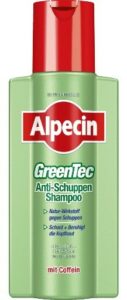Protection of eco brands – GreenTec
The case: German haircare and cosmetics manufacturer DR. KURT WOLFF developed an eco brand for a sustainable product, which was a shampoo for its ‘Alpecin’ haircare range, which reduces dandruff, achieving this effect through a natural active ingredient that is particularly kind to the skin. The company understandably wanted to emphasise this special property by using the additional eco brand, ‘GreenTec’:

It registered ‘GreenTec’ as a trade mark for, inter alia, hair shampoos and medical haircare products. However, the Federal Patent Court in Germany refused the protection of the trade mark.
Why?
The protection of brands for sustainable goods is subject to conditions! ‘Green’ is understood by the average consumer and by professionals primarily in the sense of ‘ecological, sustainable’. ‘Tec’ is the abbreviation for technology. The eco brand therefore means ‘green technology’ in the sense of ‘sustainable technology’.
But is that relevant in any way for hair shampoos? To answer this question, it is important to carry out a careful market analysis: in all industries, including personal care, haircare and pharmaceuticals, sustainability is used as an advertising slogan and as a promise of certain properties. Furthermore, green technology is also established in the body and haircare sector. This is demonstrated by the Environmental Technology Atlas for Germany of the Federal Ministry for the Environment, Nature Conservation and Nuclear Safety under the title ‘GreenTec made in Germany 2018‘. The term may also imply that sustainable chemical processes have been used in the production of pharmaceuticals. For example, where biochemists have developed special enzymes to produce drugs in a more sustainable way.
Market analysis thus shows that haircare products in particular are capable of being described using the word ‘GreenTec’. One may infer from this that they have been produced in an ‘ecological, sustainable process’ or by means of ‘green technology’.
While the word ‘GreenTec’ does not have any fixed conceptual implications – indeed, it does not indicate in what respect the ecological/environmental technology has been applied to the goods – this is in fact irrelevant. Content may still be classed as descriptive, and therefore unable to be protected, if the sign has more than one different meaning and if its content is vague and not clearly defined. It is sufficient for only one of the possible meanings to be descriptive of the goods or services.
Last but not least, it is irrelevant that the spelling of the words ‘green’ and ‘tec’ is not the usual spelling in the English language and that the capitalisation of the initial letters ‘G’ and ‘T’ is unusual. The descriptive content of ‘GreenTec’ is in fact well understood, even with these peculiarities.
‘GreenTec’ was, in conclusion, devoid of any distinctive character. It merely described the benefits of the hair shampoo and was therefore not registrable as a trade mark.
Federal Patent Court, 14 September 2020, 26 W (pat) 524/20.
Learnings: It is extremely important and can potentially save you a lot of money if, from the outset, you only consider signs that can be protected for your sustainable product. The difficulty with eco labels is that they do not convey to the buyers of your product a specific conceptual content that describes the ecological benefits of your product. In the present case, a prior careful analysis of the conceptual environment in the haircare sector would have easily revealed such descriptive content.
See also: Protection of organic brands – ZUM wohl